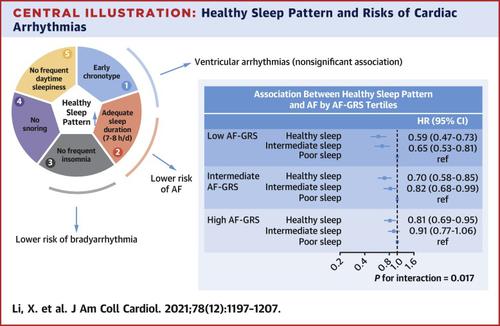Journal of the American College of Cardiology ( IF 21.7 ) Pub Date : 2021-09-13 , DOI: 10.1016/j.jacc.2021.07.023 Xiang Li 1 , Tao Zhou 2 , Hao Ma 1 , Tao Huang 3 , Xiang Gao 4 , JoAnn E Manson 5 , Lu Qi 6

|
Background
Emerging evidence has linked sleep behaviors with the risk of cardiac arrhythmias. The various sleep behaviors are typically correlated; however, most of the previous studies only focused on the individual sleep behavior, without considering the overall sleep patterns.
Objectives
The purpose of this study was to prospectively investigate the associations between a healthy sleep pattern with the risks of cardiac arrhythmias.
Methods
A total of 403,187 participants from UK Biobank were included. A healthy sleep pattern was defined by chronotype, sleep duration, insomnia, snoring, and daytime sleepiness. Weighted genetic risk score for atrial fibrillation was calculated.
Results
The healthy sleep pattern was significantly associated with lower risks of atrial fibrillation/flutter (AF) (HR comparing extreme categories: 0.71; 95% CI: 0.64-0.80) and bradyarrhythmia (HR: 0.65; 95% CI: 0.54-0.77), but not ventricular arrhythmias, after adjustment for demographic, lifestyle, and genetic risk factors. Compared with individuals with a healthy sleep score of 0-1 (poor sleep group), those with a healthy sleep score of 5 had a 29% and 35% lower risk of developing AF and bradyarrhythmia, respectively. Additionally, the genetic predisposition to AF significantly modified the association of the healthy sleep pattern with the risk of AF (P interaction = 0.017). The inverse association of the healthy sleep pattern with the risk of AF was stronger among those with a lower genetic risk of AF.
Conclusions
Our results indicate that a healthy sleep pattern is associated with lower risks of AF and bradyarrhythmia, independent of traditional risk factors, and the association with AF is modified by genetic susceptibility.
中文翻译:

健康的睡眠模式和心律失常的风险
背景
新的证据表明睡眠行为与心律失常的风险有关。各种睡眠行为通常是相关的;然而,以往的研究大多只关注个体的睡眠行为,而没有考虑整体的睡眠模式。
目标
本研究的目的是前瞻性调查健康睡眠模式与心律失常风险之间的关联。
方法
来自英国生物银行的总共 403,187 名参与者被纳入其中。健康的睡眠模式由睡眠时间类型、睡眠持续时间、失眠、打鼾和白天嗜睡来定义。计算心房颤动的加权遗传风险评分。
结果
健康的睡眠模式与较低的房颤/扑动 (AF) 风险(极端类别的 HR:0.71;95% CI:0.64-0.80)和缓慢性心律失常(HR:0.65;95% CI:0.54-0.77)显着相关。但在调整人口、生活方式和遗传危险因素后,室性心律失常则不然。与健康睡眠评分为 0-1 分的个体(睡眠不良组)相比,健康睡眠评分为 5 分的个体发生 AF 和缓慢心律失常的风险分别降低 29% 和 35%。此外,AF 的遗传易感性显着改变了健康睡眠模式与 AF 风险之间的关联(P交互作用 = 0.017)。在 AF 遗传风险较低的人群中,健康睡眠模式与 AF 风险的负相关性更强。
结论
我们的研究结果表明,健康的睡眠模式与较低的房颤和缓慢性心律失常风险相关,与传统危险因素无关,并且与房颤的关联因遗传易感性而改变。











































 京公网安备 11010802027423号
京公网安备 11010802027423号